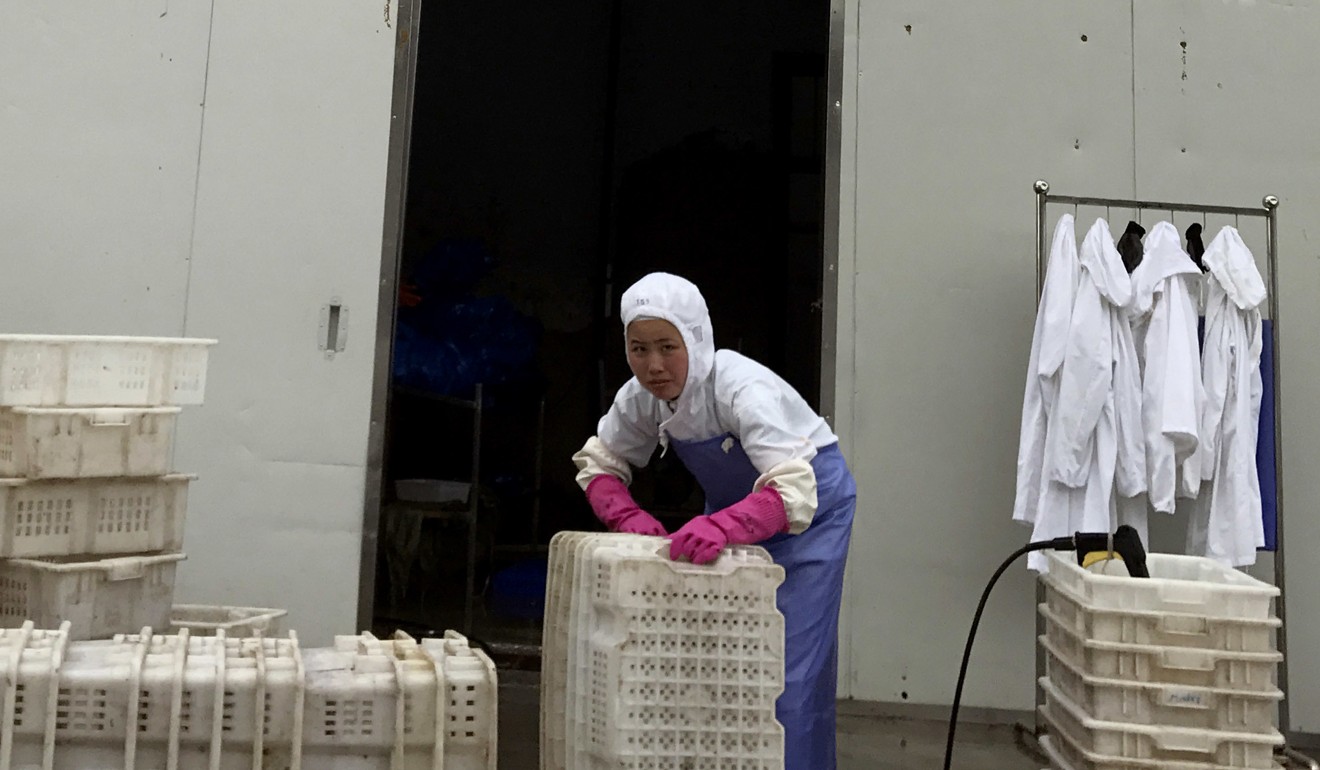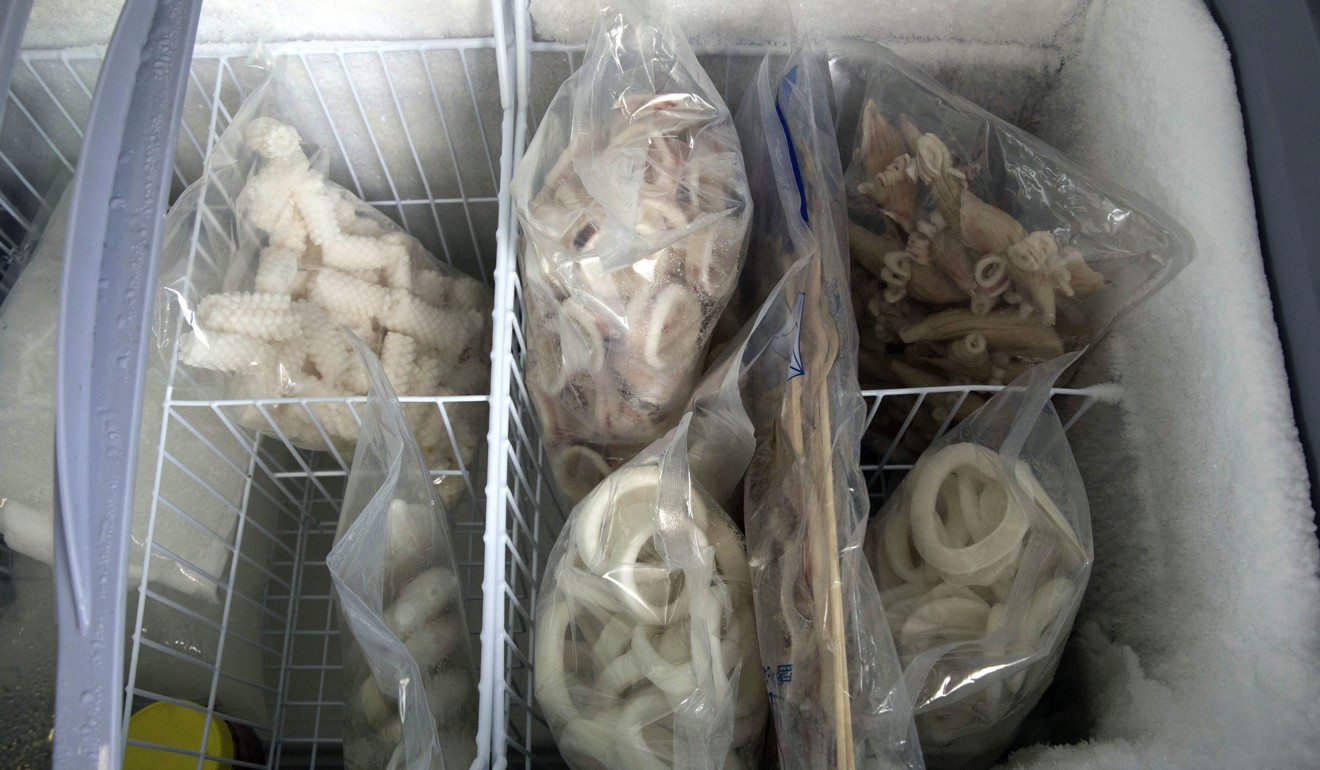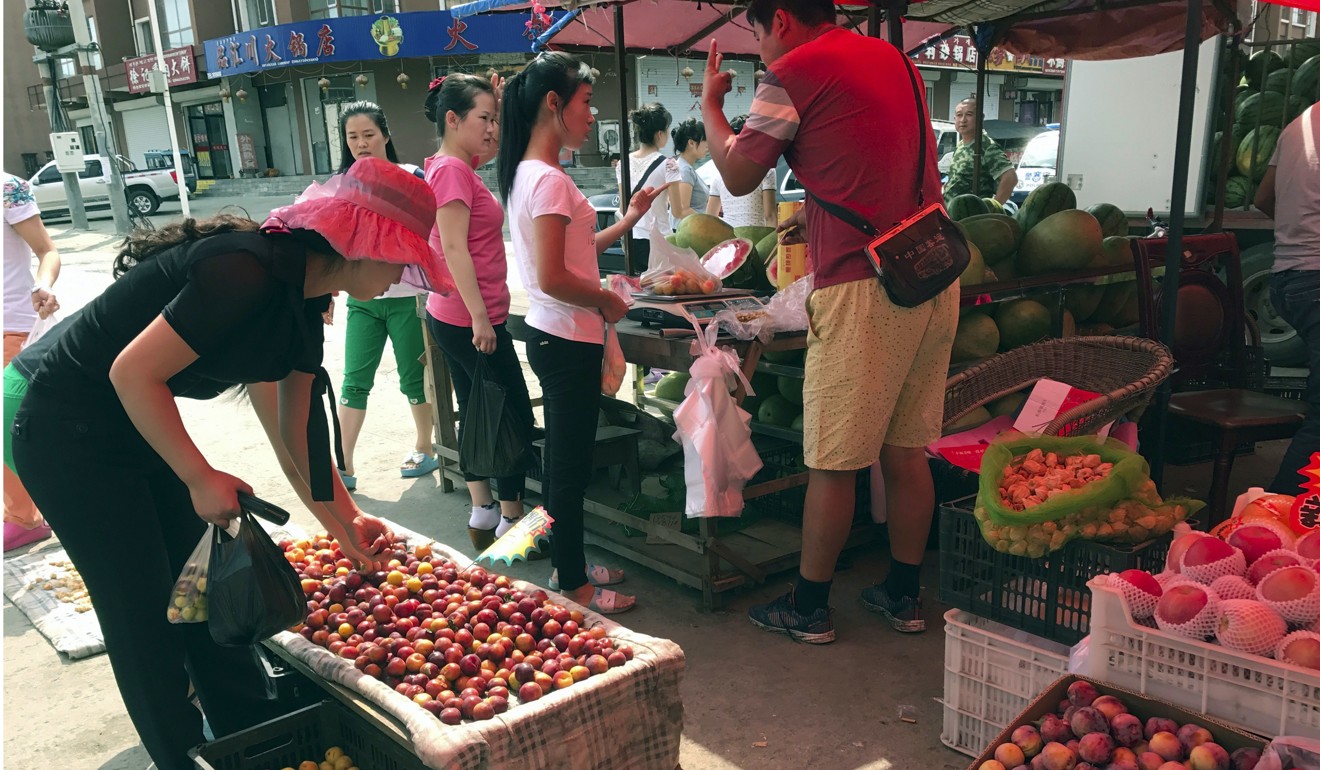
North Korean workers prep seafood in China that goes to US stores, restaurants
Americans buying salmon for dinner at Walmart or Aldi may be inadvertently subsidising Pyongyang as it builds nuclear weapons programme
The workers wake up each morning on metal bunk beds in fluorescent-lit Chinese dormitories, North Koreans outsourced by their government to process seafood that ends up in American stores and homes.
Privacy is forbidden. They cannot leave their compounds without permission. They must take the few steps to the factories in pairs or groups, with North Korean minders ensuring no one strays. They have no access to telephones or email. And they are paid a fraction of their salaries, while the rest – as much as 70 per cent – is taken by North Korea’s government.
This means Americans buying salmon for dinner at Walmart or Aldi may inadvertently have subsidised the North Korean government as it builds its nuclear weapons programme. Their purchases may also have supported what the United States calls “modern day slavery” – even if the jobs are highly coveted by North Koreans.
Besides seafood, AP found North Korean labourers making wood flooring and sewing garments in factories in Hunchun, Jilin province. Those industries also export to the US from Hunchun, but AP did not track specific shipments except for seafood.

American companies are not allowed to import products made by North Korean workers anywhere in the world, under a law signed by US President Donald Trump in early August. Importers or company officials could face criminal charges for using North Korean workers or materially benefiting from their work, according to the law.
Every Western company involved that responded to AP’s requests for comment said forced labour and potential support for North Korea’s weapons programme were unacceptable in their supply chains.
Many said they were going to investigate, and some said they had already cut off ties with suppliers.
North Koreans overseas work in construction in the Gulf states, shipbuilding in Poland, logging in Russia. In Uruguay, about 90 North Koreans crewed fishing boats last year. United Nations sanctions now bar countries from authorising new work permits for North Korean workers but do not target those already abroad.
Roughly 3,000 North Koreans are believed to work in Hunchun, a far northeastern Chinese industrial hub just a few miles from the borders of both North Korea and Russia.
In an effort to boost the local economy, China and North Korea agreed several years ago to allow factories to contract for groups of North Korean workers, establishing an industrial zone with bargain-priced labour. Since then dozens of fish processing companies have opened in Hunchun, along with other manufacturers. Using North Korean workers is legal in China, and not considered forced labour.
It’s unknown what conditions are like in all factories in the region, but AP reporters saw North Koreans living and working in several of the Hunchun facilities under the watchful eye of their overseers.
The workers are not allowed to speak to reporters. However, AP identified them as North Korean in numerous ways: the portraits of North Korea’s late leaders they have in their rooms, their distinctive accents, interviews with multiple Hunchun businesspeople. AP also reviewed North Korean labourer documents, including copies of a North Korean passport, a Chinese work permit and a contract with a Hunchun company.
Their contracts are typically for two or three years, and they are not allowed to go home early. The restrictions they work under make them very valuable employees. North Korean labourers were “more stable” than Chinese workers, said Li Shasha, a sales manager at Yanbian Shenghai Industry and Trade, a major Hunchun seafood processor.
Chinese workers have job protections that give them the right to take time off, while North Korean workers complete their contracts with few complaints, rare sick days and almost no turnover.
“They won’t take leave for some personal reason,” said Li, whose company shipped containers of squid and snow crab to the US and Canada in July and August.

They are also often considered cheaper. Li said that at the Yanbian Shenghai factory, the North Koreans’ salary is the same as for the Chinese, roughly US$300 to US$385 per month. But others say North Koreans are routinely paid about US$300 a month compared to up to US$540 for Chinese.
The work can be exhausting, with shifts lasting up to 12 hours and most workers getting just one day off each week. At some factories, labourers work hunched over tables as North Korean political slogans are blasted from waist-high loudspeakers.
Through dozens of interviews, observation, trade records and other public and confidential documents, AP identified three seafood processors that employ North Koreans and export to the US: joint venture Hunchun Dongyang Seafood Industry & Trade & Hunchun Pagoda Industry distributed globally by Ocean One Enterprise; Yantai Dachen Hunchun Seafood Products; and Yanbian Shenghai Industry & Trade.
They’re getting their seafood from China, Russia and, in some cases like snow crab, Alaska. Although AP saw North Korean workers at Hunchun Dongyang, manager Zhu Qizhen said they did not hire North Korean workers any more and refused to give details. The other Chinese companies did not respond to repeated requests for comment.
Shipping records seen by the AP show more than 100 cargo containers of seafood, more than 2,000 tonnes, were sent to the US and Canada this year from the factories where North Koreans were working in China.
Packages of snow crab, salmon fillets, squid rings and more were imported by American distributors, including Sea-Trek Enterprises in Rhode Island, and The Fishin’ Company in Pennsylvania. Sea-Trek exports seafood to Europe, Australia, Asia, Central America and the Caribbean. The Fishin’ Company supplies retailers and food service companies, as well as supermarkets.
The Fishin’ Company said it cut its ties with Hunchun processors and got its last shipment this summer, but seafood can remain in the supply chain for more than a year. Owners of both companies said they were very concerned about the North Korean labourers, and planned to investigate.
Often the seafood arrives in generic packaging, but some was already branded in China with familiar names like Walmart or Sea Queen, a seafood brand sold exclusively at Aldi supermarkets, which has 1,600 stores across 35 states. There is no way to say where a particular package ends up, nor what percentage of the factories’ products wind up in the US.
Walmart spokeswoman Marilee McInnis said company officials learned in an audit a year ago that there were potential labour problems at a Hunchun factory, and that they had banned their suppliers, including The Fishin’ Company, from getting seafood processed there. She said The Fishin’ Company had “responded constructively” but did not specify how.
Some US brands and companies had indirect ties to the North Korean labourers in Hunchun, including Chicken of the Sea, owned by Thai Union. Trade records show shipments came from a sister company of the Hunchun factory in another part of China, where Thai Union spokeswoman Whitney Small says labour standards are being met and the employees are all Chinese. Small said the sister companies should not be penalised.
Shipments also went to two Canadian importers, Morgan Foods and Alliance Seafood, which did not respond to requests for comment.
Boxes at the factories had markings from several major German supermarket chains and brands – All-Fish distributors, REWE and Penny grocers and Icewind brand. REWE Group, which also owns the Penny chain, said that they used to do business with Hunchun Dongyang but the contract had expired. All the companies that responded said their suppliers were forbidden to use forced labour.
The vast majority of the workers in Hunchun are women in their 20s. Most are thought to be hired back home by labour brokers, who often demand bribes for overseas jobs. The labourers arrive in China already divided into work teams, each led by a North Korean overseer, and remain isolated even from their own employers.
“They’re not allowed to mingle with the Chinese,” said a senior manager at a Hunchun company that employs many North Koreans. He spoke on condition he not be identified, fearing repercussions on his business. “We can only communicate with their team leaders.”
In a sense, the North Korean workers in China remain in North Korea, under constant surveillance.
They live crowded into rooms often above or next door to the factories, in a world awash in North Korean rituals.
“Let’s Follow the Ideas!” of North Korea’s leaders, urges a poster at the workers’ dormitory at Hunchun Pagoda. Portraits of the country’s first two rulers, worshipped as godlike in the deeply isolated nation, gaze down from otherwise bare walls. Laundry is often hanging up to dry and potted plants – mostly what appear to be herbs, though one room at Hunchun Pagoda has bright yellow carnations – sit on many windowsills.
But when the North Koreans are allowed to leave their compounds, they go to the city’s working-class street markets, where vendors set their wares on plastic sheets or folding tables, or sell directly from the backs of trucks.

Chinese merchants say most North Koreans are very careful about their finances. For instance, while they splurge on expensive spices imported from South Korea, they also buy Chinese noodles that cost less than half of the South Korean brands.
Estimates vary on how many North Koreans work overseas and how much money they bring in.
South Korea’s intelligence agency estimated in 2014 that 50,000 to 60,000 work in about 50 countries, most in China and Russia. That number may now be up to 100,000, according to Lim Eul-chul, a scholar at South Korea’s Kyungnam University who has interviewed numerous former labourers. Estimates that their labour brings in revenue of US$200 million to US$500 million annually to the North Korean government come from scholars, who base their findings on academic research papers, South Korean intelligence reports and sources in the Chinese business community.
Despite the pay and restrictions, these are highly sought-after jobs in North Korea, a chance to move up a rickety economic ladder and see a bit of the world beyond the closed-in nation.
Their monthly earnings in China are far more than many would earn in North Korea today, where official salaries often equal US$1 per month. Experts estimate most families live on about US$40 to US$60 a month, with much of their earnings coming from trading in the growing network of unofficial markets.
And there are plenty of benefits to working overseas. The labourers can use their earnings to start businesses in these markets.
Lim Il, a North Korean refugee, bribed a series of officials – with 20 bottles of liquor, 30 packs of cigarettes and restaurant gift cards – to get a job as a construction worker in Kuwait City in the late 1990s, when North Korea was still suffering through a horrific famine.
“I felt like I had won the lottery,” he said. “People fantasised about getting overseas labour jobs.”
Lim, a man in his late 40s who fled to South Korea in 1997 and now writes novels about the North, said that even though he was never paid his US$120-a-month salary, he was happy to simply get beef soup and rice every day.
“Unless you were an idiot, you wouldn’t give up such an opportunity,” he said. While he never thought of himself as a slave, looking back he says that is the right description: “These North Korean workers [today] still don’t know they are slaves.”
The new law in the US labels all North Korean workers both overseas and inside the country as engaging in forced labour.
For years the State Department has blacklisted North Korea in its human-trafficking reports, saying the overseas labourers and their families could face reprisals if the workers complain or try to escape, and criticising Pyongyang for keeping much of the workers’ earnings. China, Russia and other countries hosting North Korean labour are all members of the United Nations International Labour Organisation, which requires workers to receive their full salaries.
Luis CdeBaca, former US ambassador-at-large for human-trafficking issues, said both federal law enforcement agents and importers should be making sure workers are treated fairly.
“If you think about a company like Walmart, which is spending a lot of money, time and effort to clean up its supply chain, sending auditors and inspectors to factories, working with suppliers, all of that is thrown out the window if they are importing products made with exploited North Korean labour,” CdeBaca said. “It contradicts everything they are doing.”
CdeBaca conceded the North Korean workers might like their jobs.
“The question is not, ‘Are you happy?’” he said. “The question is, ‘Are you free to leave?’”
___

